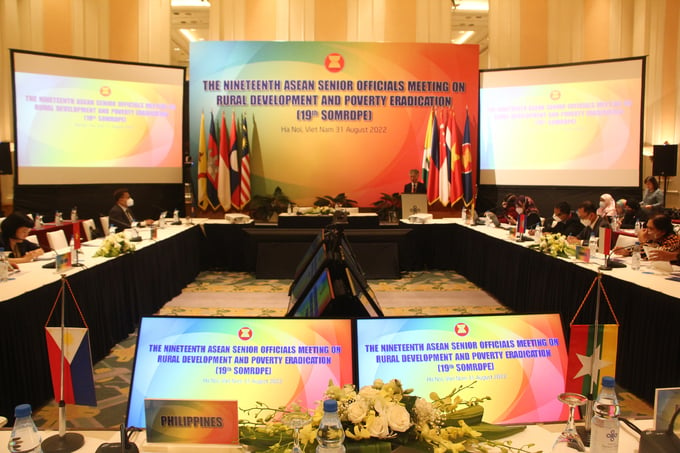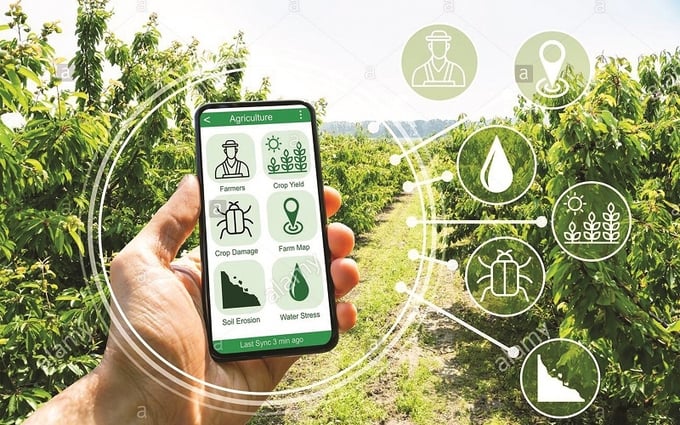November 27, 2025 | 22:36 GMT +7
November 27, 2025 | 22:36 GMT +7
Hotline: 0913.378.918
November 27, 2025 | 22:36 GMT +7
Hotline: 0913.378.918
On August 31, the 19th ASEAN Senior Officials Meeting on Rural Development and Poverty Eradication (19th SOMRDPE) was held in Hanoi under the chairmanship of Vietnam. The conference featured the attendance of over 100 delegates of senior officials from ASEAN member countries, representatives of the ASEAN Secretariat, SOM heads; and 3 partner countries: China, Japan, and Korea in the direct and online form.
Speaking at the welcome remark, Mr. Nguyen Ha Hue, Deputy Director General of the International Cooperation Department – SOMRDPE leader of Vietnam informed: “At this meeting, we will together look at the current situation of rural development- poverty eradication in the ASEAN region to identify key issues, which need to promote the cooperation for adapting to climate changes and post-Covid recovery”.
He stressed that specific cooperative activities will be demonstrated through the implementation of the ASEAN Framework of Action Plans on Rural Development and Poverty Reduction in 2021-2025.

Vietnam chaired the 19th ASEAN Senior Officials Meeting on Rural Development and Poverty Eradication and the 15th Senior Officials Meeting and three partners on Rural Development and Poverty Eradication. Photo: Linh Linh.
According to the ASEAN Framework Action Plans, Southeast Asia’s strategic importance and great potential as a global development contributor cannot be over-emphasized, and yet the region faces serious rural developmental challenges and high incidences of rural poverty. There is thus a need to review the region’s approaches to rural development. ASEAN region supplies over 50 percent of the world’s food and yet it houses a third of the world’s poor.
According to UN FAO, 74% of the world’s food producers are family farmers living in Asia and the Pacific. However, these same small-scale food producers, especially those in the ASEAN region, are threatened with food and livelihood insecurity brought about by changing climate risks, economic shocks, and, land and water grabbing threats.
In terms of rural development investments, number and value alone is not the only issue. Rather, it is how well investments are planned, sourced, and utilized given varying transformations and governance challenges in the region. Responsible investment in agriculture and food systems is essential for enhancing food security and nutrition and supporting the progressive realization of the right to adequate food, in the context of national food security. Safeguards have to be put in place to protect small men and women farmers from unfair trading practices, and to ensure that no harm is done to the environment.
In the next five years, SOMRDPE intends to contribute to the overall goal of improving the economic and social living conditions of poor people in rural areas and assisting the poorest groups of people living in rural areas to benefit from development. To work towards this goal, SOMRDPE has identified five 5 key result areas and five 5 strategic objectives.
The economic sector aims to identify rapid rural transformation, creating conditions for this area to participate in socio-economic opportunities.
As for the human factor, the Framework Action Plan aims to ensure that people in rural areas have access to education, social services, and health care towards improving well-being and healthy living in rural communities.

Illustrative photo.
In terms of protective, the Framework aims to institutionalize disaster response programs for environmental risks and climate change towards the rapid resilience of communities and households.
In terms of political factors, there should be effective governance, and institutionalization of regulations and processes to strengthen rural development initiatives and poverty reduction.
For inclusivity, it aims to institutionalize multi-stakeholder rural development mechanisms, especially enhancing the participation of women and youth and other vulnerable sectors in rural areas.
Representative of Vietnam, Ms. Pham Thi Hong Hanh, Department of International Cooperation (Ministry of Agriculture and Rural Development), said that Vietnam is one of the ASEAN countries most affected by climate change, agriculture and Vietnamese farmers are vulnerable to impacts from landslides and salinity intrusion, especially in the Mekong Delta.
In response to climate change, Vietnam has developed many programs to support farmers, help them better adapt, and improve their resilience to weather impacts such as restructuring the agricultural sector. One of Vietnam's priorities in agriculture and rural development is digital transformation, providing people with simple devices and applications to manage crops, collect crop data, and more.
“Vietnam is willing to cooperate and share experiences in the field of digital transformation as well as advanced technologies in agriculture with ASEAN member countries,” said Ms. Hanh.
In the afternoon of the same day, the 15th Senior Officials Meeting of ASEAN and 3 partner countries (China, Japan, South Korea) on rural development and poverty eradication (SOMRDPE + 3) also took place in Hanoi.
At the conference, the Vietnamese representative called for cooperation with ASEAN members and three partners in order to realize the goals of the ASEAN Framework Action Plan on rural development and poverty reduction in the period in order to promote comprehensive rural development in the ASEAN region.
Translated by Dieu Linh

(VAN) After the institutional merger, Da Nang possesses significant forest-carbon reserves and is proactively engaging in the carbon market, creating a new revenue stream.

(VAN) An Giang strengthens communication against IUU fishing, increases inspections and sanctions, and is determined to remove the EC’s “yellow card” while developing a sustainable fisheries sector.

(VAN) As green transition becomes a global trajectory, Viet Nam’s biggest challenge is not only technology and models, but how to ensure that capital flows reach the right beneficiaries.

(VAN) The Ministry of Agriculture and Environment must spearhead the construction of green governance, spanning decision-making processes and investment standards to policy evaluation mechanisms.

(VAN) The Agriculture and Environment sector of Khanh Hoa has achieved numerous milestones over the past 80 years, contributing significantly to the goal of establishing the province as a centrally governed city by 2030.

(VAN) Viet Nam is entering the pivotal period of 2025-2030, moving toward the formulation of the Remote Sensing Law, which will establish a legal foundation for the development of national digital data.

(VAN) The agricultural sector is finalizing the strategic framework for emission reduction, setting the goal of sharply cutting methane and 403.7 million tons of CO2 equivalent and moving toward Net Zero by 2050.